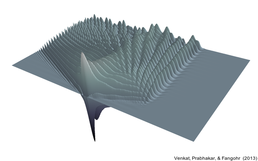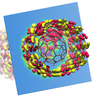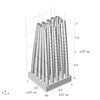Advanced Materials

Advanced materials include nanomaterials and devices, metamaterials, composites and functional materials. Research is conducted, for example, to develop advanced nanoelectronics that combine functional nanomaterials which couple stress, electric polarisation, magnetization, photonic and thermal properties. Similarly, metamaterials in photonics, magnonics and photonics, which can be used for a wide range of applications, including sensors, actuators, tailored waveguides, data storage, and data processing open new opportunities. Advanced materials are a major component of UK exports.
For queries about this topic, contact Hans Fangohr.
View the calendar of events relating to this topic.
Projects

Centre for Doctoral Training in Next Generation Computational Modelling
Hans Fangohr, Ian Hawke, Peter Horak (Investigators), Susanne Ufermann Fangohr, Thorsten Wittemeier, Kieran Selvon, Alvaro Perez-Diaz, David Lusher, Ashley Setter, Emanuele Zappia, Hossam Ragheb, Ryan Pepper, Stephen Gow, Jan Kamenik, Paul Chambers, Robert Entwistle, Rory Brown, Joshua Greenhalgh, James Harrison, Jonathon Waters, Ioannis Begleris, Craig Rafter
The £10million Centre for Doctoral Training was launched in November 2013 and is jointly funded by EPSRC, the University of Southampton, and its partners.
The NGCM brings together world-class simulation modelling research activities from across the University of Southampton and hosts a 4-year doctoral training programme that is the first of its kind in the UK.

Large-Scale Quantum Chemistry Simulations of Organic Photovoltaics
Chris-Kriton Skylaris (Investigator), Gabriele Boschetto
The aim of this project is to use first principles quantum mechanical calculations to provide a detailed atomic-level understanding of OPV materials and models of bulk heterojunctions on a far larger scale than possible before by using the ONETEP program for linear-scaling first principles quantum mechanical calculations.
Multi-Scale Modelling of Composite Riser Systems
Adam Sobey (Investigator), Hossam Ragheb
There is an ever increasing interest in exploiting ocean resources at greater depths. At these depths composite materials have a larger separation, in terms of benefits, from traditional steel structures as they offer lower maintenance costs, low weight and high durability. However, there are limited current examples of using composites for these applications meaning that empirical knowledge and specific computational tools are limited. As an example of this lack of knowledge current design guidance gives fatigue safety factors in a range of 15-50. Development of more accurate computational tools will allow an increase in safety and/or reduction of the structure.
A key aspect to increasing the usage of flexible composite risers is the ability to assess the reliability of such structures. Importance Sampling Simulation is becoming the preferred method to assess structures which ideally requires a fast and accurate structural modelling method. Whilst Finite Element Methods can provide an accurate solution to these problems they are slow to run. It is therefore proposed to investigate the use of multiscale modelling to investigate the reliability of such structures. This will involve the development of: a full-scale model to be run in conjunction with fluid mechanics simulations, a higher resolution model to investigate the fatigue hotspot near the seabed and a more local model to simulate the fatigue growth.

Multiscale models of magnetic materials at elevated temperatures
Denis Kramer (Investigator), Jonathon Waters
This project will develop and apply multi-scale modelling approaches to investigate thermal fluctuation effects in magnetic materials.

Optical Characterisation of Black Silicon for Photovoltaics Using the Finite Element Method
Jack Tyson (Investigator)
Here we present a novel method of simulating the reflectance spectra of black silicon solar cells using the finite element method. Designed in COMSOL Multiphysics is a new set of algorithm-controlled-geometries rendering a vast array of different structural permutations of silicon nanowires. Our model focused on the variation of this geometry within customisable predefined conditions in large output quantities, collated and averaged to reliably determine the reflectance of an entire black silicon solar cell.

Simulations of Magnetic Skyrmions
Hans Fangohr (Investigator), Ryan Pepper
The manipulation of magnetic skyrmions could prove to be a useful technique for storing data on an unprecedented density scale. In this project we seek to better understand their properties and ways to control them.
People
 Hans Fangohr
Hans FangohrProfessor, Engineering Sciences (FEE)
 Peter Horak
Peter HorakReader, Optoelectronics Research Centre
 Ian Hawke
Ian HawkeLecturer, Mathematics (FSHS)
 Denis Kramer
Denis KramerLecturer, Engineering Sciences (FEE)
 Chris-Kriton Skylaris
Chris-Kriton SkylarisLecturer, Chemistry (FNES)
 Otello Roscioni
Otello RoscioniResearch Fellow, Chemistry (FNES)
 Ioannis Begleris
Ioannis BeglerisPostgraduate Research Student, Engineering Sciences (FEE)
 Gabriele Boschetto
Gabriele BoschettoPostgraduate Research Student, Engineering Sciences (FEE)
 Rory Brown
Rory BrownPostgraduate Research Student, Civil Engineering & the Environment (FEE)
 Paul Chambers
Paul ChambersPostgraduate Research Student, Engineering Sciences (FEE)
 Robert Entwistle
Robert EntwistlePostgraduate Research Student, Engineering Sciences (FEE)
 Stephen Gow
Stephen GowPostgraduate Research Student, Engineering Sciences (FEE)
 Joshua Greenhalgh
Joshua GreenhalghPostgraduate Research Student, Engineering Sciences (FEE)
 James Harrison
James HarrisonPostgraduate Research Student, Engineering Sciences (FEE)
 David Lusher
David LusherPostgraduate Research Student, Engineering Sciences (FEE)
 Alvaro Perez-Diaz
Alvaro Perez-DiazPostgraduate Research Student, Engineering Sciences (FEE)
 Craig Rafter
Craig RafterPostgraduate Research Student, Engineering Sciences (FEE)
 Hossam Ragheb
Hossam RaghebPostgraduate Research Student, Engineering Sciences (FEE)
 Kieran Selvon
Kieran SelvonPostgraduate Research Student, Engineering Sciences (FEE)
 Ashley Setter
Ashley SetterPostgraduate Research Student, Engineering Sciences (FEE)
 Adam Sobey
Adam SobeyPostgraduate Research Student, Engineering Sciences (FEE)
 Alex Stuikys
Alex StuikysPostgraduate Research Student, Electronics and Computer Science (FPAS)
 Jack Tyson
Jack TysonPostgraduate Research Student, Electronics and Computer Science (FPAS)
 Jonathon Waters
Jonathon WatersPostgraduate Research Student, Engineering Sciences (FEE)
 Thorsten Wittemeier
Thorsten WittemeierPostgraduate Research Student, Engineering Sciences (FEE)
 Emanuele Zappia
Emanuele ZappiaPostgraduate Research Student, Engineering Sciences (FEE)
 Susanne Ufermann Fangohr
Susanne Ufermann FangohrAdministrative Staff, Civil Engineering & the Environment (FEE)
 Jan Kamenik
Jan KamenikAlumnus, University of Southampton
 Marijan Beg
Marijan BegExternal Member, Imperial College London
 Zheng Jiang
Zheng JiangNone, None
 Andrea Silva
Andrea SilvaNone, None